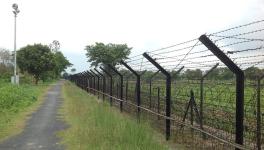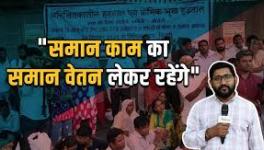Nation, COVID-19 and Migrant Workers

File Image
“Life searches for itself in the dust of the road”—nowhere is this saying more relevant than in the painful reality of India’s migrant workers. Standing 77 years after Independence, when we dream of a “New India,” at least 140-150 million people are still forced to live without rights, security, or identity in other states—and sometimes other countries—in search of livelihood.
In 1979, the Inter-State Migrant Workmen (Regulation of Employment and Conditions of Service) Act was passed to ensure protection, rights, and fair wages for migrant workers. Yet, in reality, this law has been nothing more than a cover. Its actual implementation or monitoring remains elusive even today.
COVID-19: Naked Picture of a Migrant Crisis
March 2020. With the Prime Minister’s sudden lockdown announcement, millions of workers employed in India’s major cities instantly lost their jobs. Construction sites, factories, shops, and hotels in Gujarat, Maharashtra, Delhi, Karnataka—all shut down. No vehicles, no trains, no buses—but they had to return to their families. Cash ran out, no rations, employers took no responsibility. Thousands were forced to walk hundreds of kilometres—Delhi to Bihar, Surat to Malda in Bengal, Uttar Pradesh to Odisha!
Official data says 80 people died on “Shramik Special” trains. More than 300 others perished due to accidents, hunger, or police brutality. Images of workers asleep on railway tracks being run over, and the lifeless body of young Jamlo Makdam, pierced the nation’s conscience.
Political Promises vs. Administrative Silence
The lockdown’s first shockwave exposed the conflict between Central and state governments. Left trade unions, especially the Centre of Indian Trade Unions (CITU), led movements to bring migrants home. Special trains were mocked as “Corona Express” by the West Bengal Chief Minister, spreading fear and stigma. Promises of worker lists, “One Nation One Ration Card,” compensation, and portals were made—but how much was delivered?
In reality, when Central apathy and West Bengal government’s duplicity pushed migrants into total uncertainty, CITU at both the all-India and state levels stepped in to help. During those devastating days, CITU mobilised food, medicines, and safety supplies for stranded workers across states and fought for special trains and buses, often paying fares themselves.
In West Bengal, CITU went beyond relief: tracking down returning workers, organising them into unions, and pressuring local administration for registration. This organised struggle forced the state government to start minimal compensation and portal-based registration—something the “pro-poor government” never did until movement compelled them.
Even today, the state labour department has not disclosed full data despite RTI (Right to Information) applications. The Supreme Court repeatedly asked states to submit affidavits on migrant protection during 2020–21, but like most, Bengal failed.
‘E-Shram’ Portal and Invisible Benefits
In 2021, the Central government launched the e-Shram portal to register unorganised workers. Millions in West Bengal signed up. But beyond an ID card, what real benefits did they receive? Where is maternity security, child education, health coverage?
Despite massive publicity, most workers don’t know how to access schemes with the card. There are no follow-up helpdesks, counselling, or coordination between Central and state authorities. West Bengal, like many states, lacks any effective mechanism to deliver benefits.
Language, Identity, and Political Exploitation
The 2025 “Bengali-speaking migrant workers” controversy is no accident—it is the result of decades of neglect and political excuses. Reports emerged of a February 2025 Home Ministry “alert” directing extra surveillance on Bengali-speaking workers, labelling them potential “infiltrators.”
This effectively revived the old slur: “Speak Bengali = Bangladeshi = suspect.” In Bharatya Janata Party (BJP0-ruled states, this led to arrests, violence, and even BSF (Border Security Force) “pushbacks” of Indian citizens across the Bangladesh border—a gross human rights violation under international law.
Shocking allegations suggest the West Bengal Chief Minister knew about the notification months in advance but stayed silent. Is this collusion with the centre, or are “Bengal and Bengali rights” mere slogans?
Why Kerala is an Exception
Kerala uniquely labels migrants as “Guest Workers,” not outsiders, since 2016–17. Government schemes like Aawaz Insurance, Apna Ghar hostels, skill registries, and employment guarantees ensure dignity and protection. No language-based discrimination exists. The CITU and the Communist Party of India (Marxist) has integrated migrant workers into local society, and schools even teach in mixed Bengali-Malayalam-English mediums for workers’ children.
Why Odisha Matters
Thousands of workers from Medinipur, 24 Parganas, Jhargram, Nadia, and East Medinipur migrate annually to Odisha’s ports, fisheries, and construction sites. Many are seasonal, returning during festivals. In March 2025, Odisha districts launched “verification drives” targeting Bengali workers, with raids, detentions, and violence under the “illegal Bangladeshi” label. The CITU and Left unions fought back with relief, legal aid, and awareness campaigns along the Bengal-Odisha border.
Role of Left Trade Unions
Only the Left trade unions have consistently reached the workers—not just on paper. The CITU has been central to repatriation, compensation demands, legal battles, and organising. When the Bengal Chief Minister mocked the “Corona Express,” it was CITU that protested. They remain at the forefront of the 2025 workers’ struggle.
What Needs to be Done for Migrant Workers?
1. National ID: Ensure health, ration, education, and maternity security wherever workers are.
2. Housing & Hostels: Mandatory labour hostels in every city.
3. Minimum Wage & Registration: Full enforcement of the 1979 Act with strict contractor accountability.
4. Effective Network: Registration must translate into real benefits, not just a card.
5. Political Accountability: Stop language and regional hatred; resist both state and central silence.
In a democracy, identity, language, or residence cannot be grounds for denial. Migrant workers are not just “labour”—they are the invisible pillars of India’s economy. Yet they are left without identity or protection. This insult must be resisted.
The Centre’s oppression and the Bengal’s silence can no longer be tolerated. It’s now Bengal’s duty to expose the policy-less games of the ruling BJP at the Centre and the ruling Trinamool Congress in the state to the poor, working class, and middle class. Under Left trade union leadership, a new struggle must rise—for migrant workers, for Bengal, for India.
The writer is a leading trade union organiser in West Bengal and the Working President of CITU-affiliated Bengal Chatkal Mazdoor Union. The views are personal.
Get the latest reports & analysis with people's perspective on Protests, movements & deep analytical videos, discussions of the current affairs in your Telegram app. Subscribe to NewsClick's Telegram channel & get Real-Time updates on stories, as they get published on our website.
























